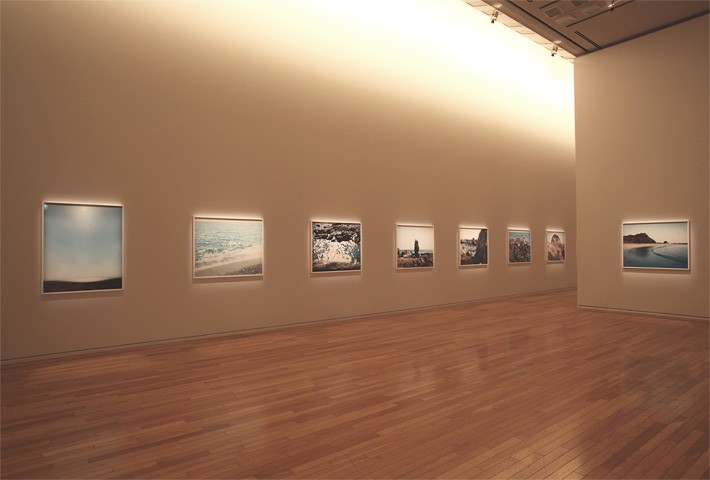Risaku Suzuki
18 Jul - 23 Sep 2015
RISAKU SUZUKI
Stream of consciousness
18 July – 23 September 2015
Eight years have passed since Risaku Suzuki’s 2007 solo exhibition "Kumano, Yuki, Sakura," which was held at Tokyo Metropolitan Museum of Photography. During that period, he has continued with his photography in the Kumano region, which represents his lifework, and further developed his snow and cherry blossom series. This exhibition presents new and recent works in these series, with the addition of his new Water Mirror and Étude series. As can be seen in the artist's declaration, "I want to present the very act of seeing," Suzuki is fascinated by the attributes of photographs and by issues relating to sight. Rather than just showing what has been photographed, Suzuki's photography is a device for posing the question, "What is the experience of seeing?" Addressing the potential of photographic expression, he succeeds in producing fresh visual experiences for viewers.
Suzuki employs a large format camera that uses 8 x 10-inch film. Scenes photographed with large format film possess rich detail because the amount of information that can be stored is proportional to the size of the film. By enlarging such images to fill the widest photographic paper available in Japan, the scene viewed by the photographer seems to have been brought into the exhibition space as is. When the time that Suzuki saw the scene and the time that the person standing in front of the work sees it coincide, the viewer is drawn into a mysterious sensation that is different from both seeing the scene directly, and seeing a 'photograph' of it.
Suzuki designs his own exhibits and photo collections. He won particularly high acclaim for the KUMANO and Piles of Time collections, in which he employed a sequential technique in the composition, and won the 25th Kimura Ihei Commemorative Photography Award in 2000. In the 2007 exhibition "Kumano, Yuki, Sakura," Suzuki's ideas were reflected in everything from the wall surfaces and lighting to the colour of the floor and walls. This gained widespread acclaim for its design, which began with low-light scenes of Kumano and escalated to works of snow and cherry blossoms that shone in brilliant white.
The Tokyo Opera City Art Gallery exhibition is also designed by Suzuki himself. In Gallery 1, photographs from Between the Sea and the Mountain, his new work shot in Kumano, unfold in succession, while in Gallery 2, four series of works, Water Mirror, White, SAKURA, and Étude, seem to resonate together. To Suzuki, who sees the exhibition venue as a place for evoking an experience, the exhibition design is a work of art in itself. Here, the design extends to the relationship between three digital video works and the photographs. The exhibition is an opportunity to discover anew the expressiveness of photography, and to experience the freshness and immediacy of the act of seeing.
Stream of consciousness
18 July – 23 September 2015
Eight years have passed since Risaku Suzuki’s 2007 solo exhibition "Kumano, Yuki, Sakura," which was held at Tokyo Metropolitan Museum of Photography. During that period, he has continued with his photography in the Kumano region, which represents his lifework, and further developed his snow and cherry blossom series. This exhibition presents new and recent works in these series, with the addition of his new Water Mirror and Étude series. As can be seen in the artist's declaration, "I want to present the very act of seeing," Suzuki is fascinated by the attributes of photographs and by issues relating to sight. Rather than just showing what has been photographed, Suzuki's photography is a device for posing the question, "What is the experience of seeing?" Addressing the potential of photographic expression, he succeeds in producing fresh visual experiences for viewers.
Suzuki employs a large format camera that uses 8 x 10-inch film. Scenes photographed with large format film possess rich detail because the amount of information that can be stored is proportional to the size of the film. By enlarging such images to fill the widest photographic paper available in Japan, the scene viewed by the photographer seems to have been brought into the exhibition space as is. When the time that Suzuki saw the scene and the time that the person standing in front of the work sees it coincide, the viewer is drawn into a mysterious sensation that is different from both seeing the scene directly, and seeing a 'photograph' of it.
Suzuki designs his own exhibits and photo collections. He won particularly high acclaim for the KUMANO and Piles of Time collections, in which he employed a sequential technique in the composition, and won the 25th Kimura Ihei Commemorative Photography Award in 2000. In the 2007 exhibition "Kumano, Yuki, Sakura," Suzuki's ideas were reflected in everything from the wall surfaces and lighting to the colour of the floor and walls. This gained widespread acclaim for its design, which began with low-light scenes of Kumano and escalated to works of snow and cherry blossoms that shone in brilliant white.
The Tokyo Opera City Art Gallery exhibition is also designed by Suzuki himself. In Gallery 1, photographs from Between the Sea and the Mountain, his new work shot in Kumano, unfold in succession, while in Gallery 2, four series of works, Water Mirror, White, SAKURA, and Étude, seem to resonate together. To Suzuki, who sees the exhibition venue as a place for evoking an experience, the exhibition design is a work of art in itself. Here, the design extends to the relationship between three digital video works and the photographs. The exhibition is an opportunity to discover anew the expressiveness of photography, and to experience the freshness and immediacy of the act of seeing.

